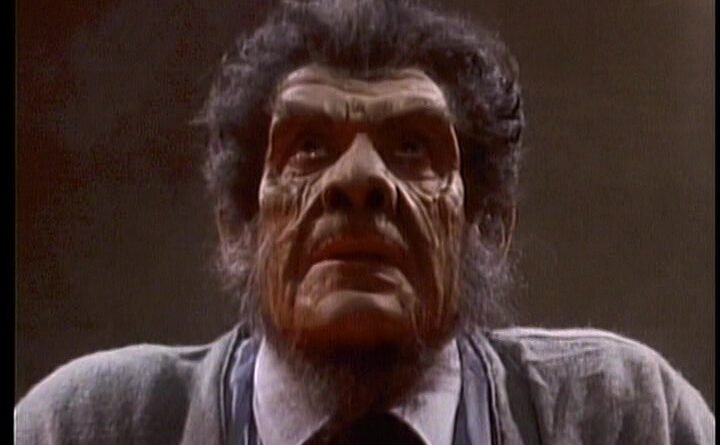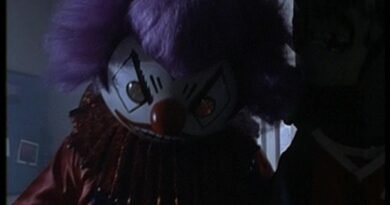Tales from the Darkside: “The Devil’s Advocate” (S2E07)

There are bottle episodes, and then there’s “The Devil’s Advocate” – a claustrophobic one-man show where a radio host slowly unravels on air. Minimalist, talk-heavy, and unsettlingly realistic in its bitterness, this episode dares to ask: What if your favourite angry talk show host was literally from hell?
Plot Summary
The episode takes place entirely within the studio of a late-night AM radio show hosted by Luther Mandrake, also known as “The Devil’s Advocate.” Luther is a rage-fueled, chain-smoking, red-meat conservative (by 1980s standards) who spends his nightly broadcast spewing venom at everyone from lazy teenagers to corrupt politicians.
We never leave the studio. We don’t meet any of the callers. The entire runtime is just Luther talking into his microphone, his voice increasingly hoarse, his rants more unhinged. Slowly, something begins to shift. The lights flicker. Strange sounds creep into the audio. Luther starts noticing things are… off. His engineer has vanished. The clock won’t move. And the studio door won’t open.
By the end of the episode, it becomes clear that Luther has either crossed into a personal purgatory or is, in fact, in hell itself. The mic is still live, but no one is listening. Or maybe… everyone is.
What Works
Powerhouse Performance by Jerry Stiller
Yes, that Jerry Stiller (of Seinfeld and King of Queens fame). Known mostly for comedic roles, Stiller gives a compelling and surprisingly intense performance here. He makes Luther both loathsome and oddly sympathetic. It’s not easy to carry a 22-minute monologue, but he absolutely owns it.
Clever Use of Limited Setting
The single-location approach works beautifully. As the studio becomes more oppressive, the atmosphere thickens. The use of sound effects and subtle visual cues (like the clock freezing or the light dimming) create a surreal, dreamlike descent.
Unreliable Reality
Is Luther really trapped in hell? Is it a mental breakdown? A drug-fueled hallucination? The episode never confirms anything, and that ambiguity enhances the horror. It plays with the idea that Luther’s anger has finally consumed him, or been judged.
What Doesn’t Work
Heavy-Handed Dialogue
Some of Luther’s rants go on a bit too long and can feel repetitive. The social commentary, while sharp in places, occasionally veers into caricature. Depending on your tolerance for monologues, this might test your patience.
Minimal Action
If you’re looking for monsters, gore, or even basic movement, you won’t find it here. This is a cerebral episode—more Twilight Zone than Tales from the Crypt. That may not be everyone’s cup of cursed coffee.
Themes: Judgement, Isolation, and the Price of Rage
At its core, “The Devil’s Advocate” is about a man who has talked himself into oblivion. Luther uses rage as a weapon, a shield, and an identity. But what happens when the world stops listening? When there’s no one left to blame?
It’s also a meditation on media influence and self-destruction. Luther’s words are meant to provoke, but there’s an emptiness behind them. His fury is performative, hollow—and maybe that hollowness is what damns him.
Final Thoughts: Monologue Horror Done Right
This is one of the more ambitious episodes of Tales from the Darkside, especially in terms of structure. It hinges entirely on dialogue and performance. Luckily, both are up to the task. While it may feel slow or overly theatrical to some, it offers a haunting character study of a man literally locked in with his own voice.
It’s a reminder that hell isn’t always fire and brimstone. Sometimes, it’s just a soundproof booth and a dead air signal.
Who Would Enjoy This Episode?
- Fans of psychological horror and Twilight Zone-style morality tales
- Viewers who love minimalist, performance-driven storytelling
- Anyone curious to see Jerry Stiller in a dramatically different role
Who Might Not Enjoy It?
- Those looking for action, monsters, or supernatural spectacle
- Viewers who dislike monologue-heavy episodes
- Anyone not interested in media satire or political commentary
Final Verdict: Static-Filled and Stylistically Strong
“The Devil’s Advocate” isn’t a traditional horror story, but it’s an effective slow-burn psychological tale. It succeeds thanks to a strong performance, a tight script, and the creeping dread of isolation. It may not scream, but it whispers unsettling truths through the static.




